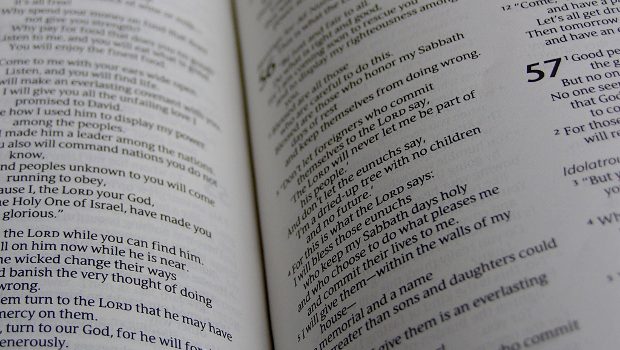Christian, It’s Time For Your Check-up
Personally, I don’t like going to see a doctor, even when I feel sick. It’s not much fun to be poked and prodded, having blood drawn and analyzed, and then waiting around for a diagnosis. The process isn’t much fun, but it’s necessary to ensure our continued good health or to begin treatment for a given condition. Yet, as much as people dislike going to see the doctor for a checkup, people tend to avoid any type of spiritual evaluation as well. So let me ask you a question, “How are you doing spiritually?” The Bible is full of diagnostics for us to gauge our spiritual condition. The apostle John, gives us a very good and concise outline for a spiritual checkup at the beginning of his first letter. Let’s take a look at 1 John chapter 1 and go through this check-up together.
The Goal (1 John 1:1-4)
To begin, John wants us to know what the goal of the Christian life ought to be. In the first 4 verses, John compacts the entire Biblical narrative into one measurable goal – fellowship with God. His opening statements harken back to the very beginning of creation when Adam and Eve enjoyed perfect fellowship with God. Yet sin broke that fellowship and it became necessary for Jesus to come in the flesh so that fellowship could be restored, not just temporarily, but eternally. Thus a healthy and joyful Christian life will be one where we experience fellowship with God through the death and resurrection of Jesus, and flowing out of that will also come fellowship with other believers. This is the epitome of the Kingdom of God, which has already come but is not yet complete. So our healthy spiritual goal is to experience fellowship with the Father and with other believers.
The Baseline (1 John 1:5)
Ok, so our goal is to have the fullness of Christian fellowship, but how do we know if we’re really experiencing that fellowship? Whenever a medical professional administers a test, in order to evaluate the results they must be measured against a proper baseline. The baseline is the measure of good health. It’s where we want the results to be. In 1 John 1:5, the apostle gives us such a baseline, “God is light, and in Him is no darkness at all.” When John says that God is light, he is referring to God’s righteousness and holiness. Darkness cannot persist in the presence of light. Anything that was meant to be concealed is revealed when light is cast upon it. John wants us to understand that God is so holy and righteous that he uses a double negative construction to pound home the fact that there is absolutely nothing dark or sinful about God at all. A more literal way to translate the original Greek would be, “God is light, and in Him there is no darkness, not even in the least!” So our goal of fellowship with God requires us to be equally holy and righteous. Perfect health means a perfectly healthy heart, full of light and free from darkness.
The Diagnostic Tests (1 John 1:6-10)
So, given what we’ve covered so far, if I were to ask you now, “How are you doing spiritually?” would your answer change? John is giving us a tremendous goal to live up to, and he follows that up with three diagnostic checks for us to use to examine our lives and see how our living measures up to the baseline of God’s righteousness.
Diagnostic 1: Words are not enough (1 John 1:6)
The first diagnostic John gives us is that our actions must correspond to our words. We cannot simply say that we are Christians and continue living in patterns of darkness trying to hide our sin. If we are living lives of fellowship with God, his light will shine on and through every part of our lives. We cannot simply say, “Oh yes, I asked Jesus to be my savior once upon a time, so I’m good to go” and then proceed to live without regard to his Word. If that is the case, John says that “we lie and do not do the truth.” Truth corresponds to light and falsehood corresponds to darkness. John’s first check on our health asks us, “Where are you walking: in the light or in the darkness?”
Diagnostic 2: Confession is good for the soul (1 John 1:8)
The first diagnostic deals with our actions; the second diagnostic deals with our words about our actions. John is pointing to the reality of sin in our lives and tells us that we can gauge our spiritual health by our own admission of our sins. This is an ongoing process. John knows that even though true Christians will strive to walk in the light, sin does happen. The Christian with a healthy relationship with God will allow his light to shine in the dark places of his/her life and make a full confession when our actions lead us into darkness. If fail to confess our sins because we are afraid of how others will think of us, then we fear man more than we fear God. This fear is ridiculous because the pervasiveness of sin runs through the lives of all believers, and to think that we can fool others into thinking that we don’t sin is the height of arrogance. In their futile hopes of fooling other people John says such people only deceive themselves.
Diagnostic 3: The responsibility for sin is ours (1 John 1:10)
The final diagnostic deals with the general understanding that there was a reason that God had to send Jesus to become a man and die to make atonement for our sins. Many people today want to completely eliminate talk of sin from public life. We deal with sin as if it is something outside of us. We want to blame sin on hereditary factors or our environment or as a disease – something beyond our control. We want to think of sin as just part of our fate as human beings. The problem with such thinking is that sin is completely internal and not external. Sin is wholly and undeniably our fault! And when we try to downplay sin as being outside of our control, we make God to be a liar and we make a mockery of the death of our Savior.
The Diagnosis and The Cure (1 John 2:1-2)
Let’s recap, the goal of the Christian life is joyful fellowship with God. Our baseline is the knowledge that God is light, perfect in his righteousness and holiness. The diagnostic tests run against that baseline show that we are in deep trouble. The purpose of these tests is to keep us from sinning, but the plain and simple fact is that we do sin. The apostle John is ready to make his diagnosis: We are sinners, and if we are truly honest we will say that we sin more than we want to admit to ourselves or to anyone else. We deserve death. We deserve hell. But thankfully the Gospel story doesn’t end there. The cure for sin is available to us. We need not fear death because, “if anyone does sin, we have an advocate with the Father, Jesus Christ the righteous. He is the propitiation for our sins.” (1 John 2:1b-2a) Our problem with sin runs so deep that we cannot possibly deal with on our own. The diagnosis is clear: We are sinners in need of a Savior. We can not enjoy fellowship with God and His Church on our own apart from the atoning work of Jesus Christ. It is our union with Christ that brings us into fellowship with God. His righteousness, holiness and sinless perfection is given to us when we accept His offer of salvation and live according to the light. Apart from Jesus, death is certain. With Jesus, death is defeated. Christian, this is your spiritual check-up – acknowledge your sin and run to Jesus, your health depends on it.
Come, ye sinners, poor and needy,
Weak and wounded, sick and sore;
Jesus ready stands to save you,
Full of pity, love and pow’r.
Refrain:
I will arise and go to Jesus,
He will embrace me in His arms;
In the arms of my dear Savior,
Oh, there are ten thousand charms.
Come, ye thirsty, come, and welcome,
God’s free bounty glorify;
True belief and true repentance,
Every grace that brings you nigh.
Come, ye weary, heavy-laden,
Lost and ruined by the fall;
If you tarry till you’re better,
You will never come at all.
View Him prostrate in the garden;
On the ground your Maker lies;
On the bloody tree behold Him;
Sinner, will this not suffice?
Lo! th’ incarnate God ascended,
Pleads the merit of His blood:
Venture on Him, venture wholly,
Let no other trust intrude.
Let not conscience make you linger,
Not of fitness fondly dream;
All the fitness He requireth
Is to feel your need of Him.
(Words by Joseph Hart, 1759. Public Domain)
To Christ alone be the glory!










